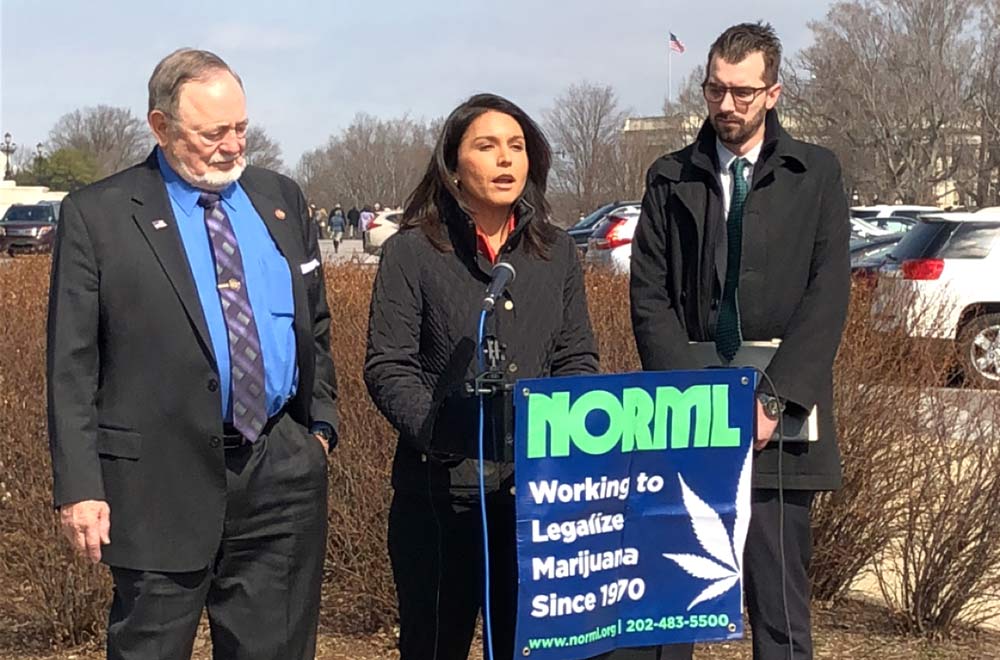March 7, 2019
 Representatives Tulsi Gabbard (HI-02) and Don Young (AK-AL) introduced today two landmark bipartisan marijuana bills.
Representatives Tulsi Gabbard (HI-02) and Don Young (AK-AL) introduced today two landmark bipartisan marijuana bills.
Introduced was The Ending Federal Marijuana Prohibition Act of 2019, to remove marijuana from the federal Controlled Substances list and allow states the freedom to regulate marijuana as they choose, without federal interference.
In the previous Congress, The Ending Federal Marijuana Prohibition Act became the first bill in American history to end the federal policy of criminalization that earned bipartisan support.
“The Ending Federal Prohibition Act is about acknowledging political, scientific, and economic reality. Marijuana legalization is here to stay and it is time that federal policy reflect that.” said NORML Executive Director Erik Altieri. “This legislation is effective in its simplicity, it will deschedule marijuana from the Controlled Substances Act and end federal prohibition once and for all, full stop.”
You can send a message to your Representative in support of the bill in less than 30 seconds here.
Also introduced was The Marijuana Data Collection Act of 2019, which would study the effects of state legalized medicinal and non-medicinal marijuana programs from a variety of perspectives, including state revenues, public health, substance abuse and opioids, criminal justice, and employment.
Both Representative Gabbard and Young spoke outside the Capitol on Thursday, March 7th to introduce the bills and highlight their urgency.
The members were joined by NORML Executive Director Erik Altieri as well as representatives from the Minority Cannabis Business Association, The Veterans Cannabis Coalition, and individuals impacted by criminalization.
Shanita Penny, President of the Minority Cannabis Business Association (MCBA) said, “The Ending Federal Marijuana Prohibition Act of 2019 removes a roadblock impeding criminal justice reform, patient and consumer access, research and innovation. Removing marijuana from the federal Controlled Substances Act is essential to comprehensive reform and the evolution of the cannabis industry into one that is equitable and sustainable.”
Eric Goepel, of the Veterans Cannabis Coalition said, “There have been over 100,000 veteran suicides and overdoses in the last 15 years. Millions of veterans have been prescribed, both in the VA and private health, cocktails of addictive and toxic drugs without evidence or alternatives. In their own words, veterans will tell you how cannabis has provided relief and hope when nothing else worked. If it helps veterans, it can help all Americans. The time is long past due to end this 80 year injustice and dismantle prohibition.”

Thirty-three states, Washington, D.C. and the U.S. territories of Guam and Puerto Rico have enacted legislation specific to the physician-authorized use of cannabis. Moreover, an estimated 73 million Americans now reside in the ten states where anyone over the age of 21 may possess cannabis legally. An additional fifteen states have passed laws specific to the possession of cannabidiol (CBD) oil for therapeutic purposes.
Sixty-eight percent of registered voters “support the legalization of marijuana,” according to 2018 national polling data compiled by the Center for American Progress. The percentage is the highest level of support for legalization ever reported in a nationwide, scientific poll.
Majorities of Democrats (77 percent), Independents (62 percent), and Republicans (57 percent) back legalization. The results of a 2017 nationwide Gallup poll similarly found majority support among all three groups.
To date, these statewide regulatory programs are operating largely as voters and politicians intended. The enactment of these policies have not negatively impacted workplace safety, crime rates, traffic safety, or youth use patterns. They have stimulated economic development and created hundreds of millions of dollars in new tax revenue.
Specifically, a 2019 report estimates that over 211,000 Americans are now working full-time in the cannabis industry. Tax revenues from states like Colorado, Oregon, and Washington now exceed initial projections. Further, numerous studies have identified an association between cannabis access and lower rates of opioid use, abuse, hospitalizations, and mortality.















